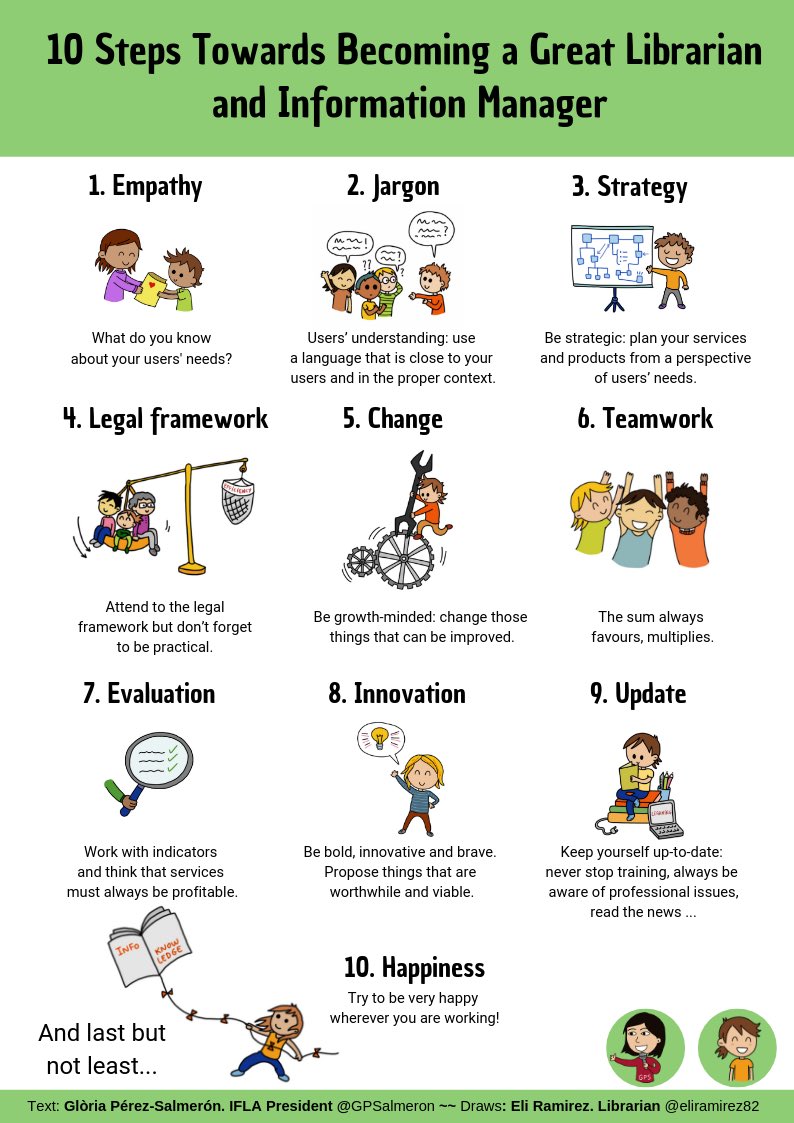How to Become a Librarian: Your Ultimate Guide

To become a librarian, earn a Master’s in Library Science degree and gain experience through internships. Pursue additional certifications for specialization.
Are you passionate about organizing information and helping people find resources? If so, a career as a librarian might be the perfect fit for you. Librarians play a crucial role in connecting individuals with knowledge and information. By obtaining a Master’s in Library Science degree, you can develop the necessary skills to excel in this field.
Additionally, gaining practical experience through internships and pursuing specialized certifications can enhance your expertise and job prospects. If you are ready to embark on a rewarding journey of facilitating learning and research, consider the fulfilling path of becoming a librarian.

Credit: www.everylibraryinstitute.org
The Role Of A Librarian
Becoming a librarian is an excellent career choice for those who are passionate about connecting people with information and knowledge. Librarians play a crucial role in facilitating access to resources, promoting literacy, and supporting a love of learning within their communities.
Key Responsibilities
Librarians are responsible for a diverse range of tasks, including:
- Managing library collections
- Assisting patrons with research and reference questions
- Developing and organizing library programs and events
- Teaching information literacy skills
- Collaborating with educators and community organizations
- Staying current with technological advancements
Diverse Work Environments
Librarians have the opportunity to work in a variety of settings, such as:
- Public libraries
- Academic libraries
- Specialized libraries (e.g., law, medical, corporate)
- Archives and museums
- Information centers
Educational Pathways
Embark on your journey to become a librarian by pursuing a degree in library science. Gain experience through internships and volunteer work at libraries. Obtain a master’s degree in library science for advanced career opportunities.
Librarians play a vital role in providing access to information and resources to communities. Becoming a librarian requires specific educational qualifications, including undergraduate and graduate degrees. In this post, we will explore the educational pathways to becoming a librarian, focusing on undergraduate degrees and master’s in Library Science.
Undergraduate Degrees
To become a librarian, you must have at least a Bachelor’s degree. While there is no specific undergraduate degree required to become a librarian, it is recommended to pursue a degree in a field related to library science, such as English, history, or education. A degree in a related field provides a solid foundation in research, critical thinking, and communication skills, all of which are essential for a career in librarianship. Additionally, it is recommended to gain experience working in a library or volunteering in a library setting during your undergraduate studies.
Master’s In Library Science
After completing an undergraduate degree, the next step to becoming a librarian is to earn a Master’s in Library Science (MLS) degree. The MLS program typically takes two years to complete and covers topics such as cataloging, reference services, collection development, and library management. Many MLS programs also offer specializations, such as school librarianship, academic librarianship, or public librarianship. These specializations provide additional coursework and experience in a specific area of librarianship. In addition to completing coursework, MLS students are also required to complete a field experience or internship in a library setting. This provides hands-on experience working in a library and allows students to apply the knowledge and skills learned in their coursework. In conclusion, becoming a librarian requires specific educational qualifications, including a Bachelor’s degree and a Master’s in Library Science degree. Pursuing a degree in a related field and gaining experience in a library setting during your undergraduate studies can provide a solid foundation for a career in librarianship.
Specializations In Librarianship
When it comes to pursuing a career as a librarian, there are various specializations to choose from. Each specialization caters to different types of libraries and requires specific skills and knowledge. In this blog post, we will explore three main specializations in librarianship: Public Librarians, Academic Librarians, and Special Librarians.
Public Librarians
Public librarians play a vital role in serving the needs of the general public. They work in public libraries and focus on providing resources and services to individuals of all ages and backgrounds. Public librarians are responsible for managing library collections, assisting patrons with reference and research inquiries, and organizing community programs and events.
Key Responsibilities of Public Librarians:
- Assisting patrons in finding relevant information and resources
- Developing and maintaining library collections
- Organizing community programs and events
- Collaborating with local schools and organizations
Academic Librarians
Academic librarians work in educational institutions such as colleges and universities. Their primary focus is to support the research and learning needs of students, faculty, and staff. Academic librarians assist users in accessing scholarly resources, provide instruction on information literacy skills, and manage library collections that cater to specific academic disciplines.
Key Responsibilities of Academic Librarians:
- Assisting students and faculty in research and accessing scholarly resources
- Teaching information literacy skills and conducting library instruction sessions
- Collaborating with faculty to integrate information literacy into the curriculum
- Managing specialized collections related to academic disciplines
Special Librarians
Special librarians work in diverse settings such as corporations, government agencies, hospitals, and law firms. They focus on managing specialized information resources that cater to the specific needs of their organization. Special librarians play a crucial role in organizing and providing access to industry-specific information, conducting research, and assisting users in making informed decisions.
Key Responsibilities of Special Librarians:
- Managing specialized information resources
- Conducting research and gathering industry-specific information
- Providing assistance and guidance to users in accessing relevant information
- Collaborating with stakeholders to meet the information needs of the organization
By choosing a specialization in librarianship, individuals can focus their expertise on a specific library setting and cater to the unique needs of their patrons. Whether you aspire to work in a public library, an academic institution, or a specialized organization, each specialization offers rewarding opportunities to make a positive impact on the community you serve.

Credit: www.youtube.com
Certifications And Licenses
Obtaining the necessary certifications and licenses is an important step in becoming a librarian. These credentials not only validate your expertise but also demonstrate your commitment to the profession. In this section, we will explore the different requirements and optional certifications that can enhance your career as a librarian.
State Requirements
Each state has its own set of requirements for librarians. It is essential to familiarize yourself with the specific guidelines of the state where you intend to work. These requirements usually include a master’s degree in library science from an accredited institution. Some states may also require additional coursework in specific areas such as cataloging or information technology.
Moreover, you may need to pass a state-administered examination to obtain a librarian license. This exam typically assesses your knowledge of library principles, practices, and ethical standards. It is important to research and understand the licensing process in your state to ensure compliance.
Optional Certifications
In addition to meeting state requirements, pursuing optional certifications can further enhance your professional standing and open up more opportunities. These certifications showcase your specialized knowledge and skills in specific areas of librarianship.
One widely recognized certification is the Master Librarian Certification (MLC), offered by the American Library Association (ALA). This certification demonstrates your proficiency in various aspects of library administration, collection development, and reference services. It is a valuable credential for those aspiring to take on leadership roles within the library field.
Another noteworthy certification is the Specialist Librarian Certification (SLC), also provided by the ALA. This certification allows you to specialize in areas such as children’s librarianship, academic librarianship, or digital librarianship. By obtaining this certification, you can showcase your expertise in a specific domain and cater to the unique needs of different library patrons.
Other organizations, such as the Special Libraries Association (SLA), offer certifications tailored to specific types of libraries, such as medical or law libraries. These specialized certifications can expand your knowledge in niche areas and make you a sought-after professional in your chosen field.
Remember, while optional, these certifications can give you a competitive edge and demonstrate your commitment to professional development. They provide tangible proof of your expertise and dedication, making you a more desirable candidate for librarian positions.
Gaining Relevant Experience
Becoming a librarian requires gaining relevant experience in the field. This can be achieved through internships, volunteering, and part-time positions. These experiences provide valuable insights and practical knowledge that can set you apart in the competitive field of library science.
Internships And Volunteering
Internships and volunteering opportunities offer hands-on experience in library settings. They allow aspiring librarians to work closely with experienced professionals, gaining insight into the day-to-day operations of libraries. These opportunities often provide exposure to different aspects of library management, including cataloging, reference services, and collection development.
Part-time Positions
Part-time positions in libraries offer a chance to gain practical experience while pursuing a degree in library science. These roles allow individuals to work directly with library patrons, assist with administrative tasks, and contribute to the overall functioning of the library. They also provide an opportunity to develop important skills such as information organization, customer service, and resource management.
Essential Skills For Librarians
Technical Skills
Librarians need to have proficiency in various technical skills to effectively manage library operations. They should be adept at information management systems and have a strong understanding of cataloging software. Additionally, librarians should possess digital literacy to assist patrons with accessing online resources and using library databases.
Interpersonal Skills
Strong interpersonal skills are crucial for librarians to interact with library patrons and colleagues. Librarians should have excellent communication skills to effectively convey information and assist patrons with their inquiries. Additionally, they should be adept at collaborating with others to organize events and programs that cater to the community’s needs.
Navigating The Job Market
Embarking on a career path as a librarian involves obtaining a Master’s in Library Science degree. Gain practical experience through internships or part-time roles in libraries. Network with professionals in the field to stay updated on job openings and industry trends.
Job Search Strategies
Navigating the job market as a prospective librarian requires strategic planning. Begin by researching job opportunities in libraries. Network with current librarians for insider tips.
Resume And Cover Letter Tips
Craft a tailored resume highlighting relevant experience and skills. Write a concise cover letter expressing your passion for library work. Proofread for errors.
Continuing Professional Development
Workshops And Conferences
Attending workshops and conferences helps librarians stay updated.
Networking opportunities and learning new trends are key benefits.
- Enhances knowledge on library technologies.
- Improves communication and leadership skills.
- Increases awareness of diverse library resources.
Joining Professional Organizations
Being part of professional organizations offers valuable resources.
Access to online forums and publications for latest industry insights.
- Collaborate with peers on best practices.
- Participate in webinars and training sessions.
- Opportunities for leadership roles and skill development.

Credit: twitter.com
Frequently Asked Questions
How Long Does It Take To Become A Librarian?
Becoming a librarian typically takes around 4 years to complete a bachelor’s degree in library science or a related field. Some positions may require a master’s degree, which can take an additional 1-2 years of study. It is also important to gain practical experience through internships or entry-level positions to enhance job prospects.
What Skills Are Needed To Be A Librarian?
To be a successful librarian, you should possess strong organizational skills, excellent communication abilities, and a passion for research and information. Additionally, proficiency in technology, problem-solving skills, and the ability to work well with diverse groups of people are essential.
Being detail-oriented and having a love for books and learning are also valuable traits.
Is A Master’s Degree Required To Become A Librarian?
While a master’s degree in library science or a related field is not always required, it is becoming increasingly common for higher-level positions in libraries. A master’s degree provides specialized knowledge in library and information science, cataloging, research methods, and more.
It can enhance job opportunities and open doors to leadership roles within the field.
Conclusion
Becoming a librarian is a rewarding career path that requires a combination of education, experience, and passion for helping others. By following the steps outlined you can gain the necessary qualifications and skills to succeed in this field. Remember to stay up-to-date with the latest trends and technologies in library science, and always strive to provide excellent service to patrons.
With dedication and hard work, you can achieve your goal of becoming a successful librarian.



